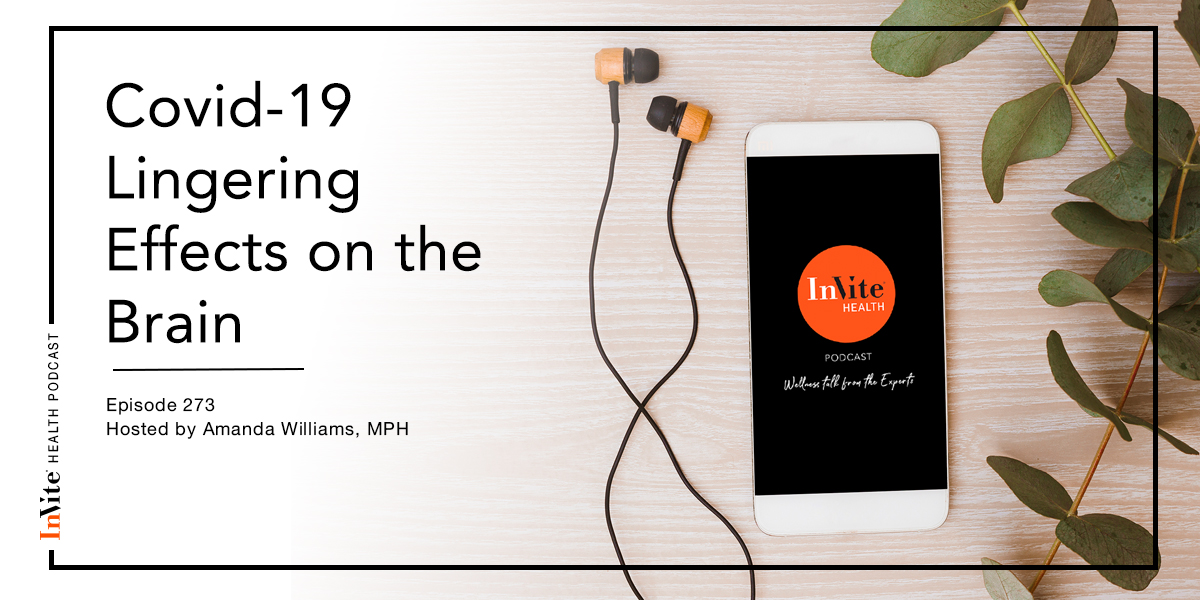Covid-19 Lingering Effects on the Brain – InVite Health Podcast, Episode 273

covid-19
Invite Health Podcast, Episode hosted by Amanda Williams, MPH
Subscribe Today!
When we think about the long-term implications of COVID-19, we have to start to think beyond that of the respiratory system. Now that we know more about the coronavirus and the long-lasting impact in terms of symptoms, we have to really focus on what is happening in the central nervous system. I want to focus on that today because there are more and more studies and more and more research coming out that have really indicated that the coronavirus itself is highly affecting our brain. I want to talk about that today and some of the things you can be doing if you yourself are dealing with this or if you have a friend, family member or coworker who is dealing with this.†
COVID long haulers
I want to talk about the COVID long haulers because I think that this is a really important thing to not overlook. There are more and more people who have been infected with COVID-19 who are experiencing, every single day, these long-lasting and really negative side effects or symptoms from COVID. We want to understand a little bit more about that.†
We know that some people who have had COVID can have chronic respiratory issues such as an ongoing cough or shortness of breath. Researchers at the University of California Davis have been looking at the COVID long haulers and are seeing that there are so many symptoms that people are complaining about well after they have recovered from the initial infection. So many of these symptoms are directly correlated with the central nervous system, including headaches, difficulty sleeping, fatigue and brain fog. Brain fog is one of the biggest complaints that people have been reporting back, as well as being incredibly forgetful and having difficulty focusing and concentrating on basic things that never challenged them before. Researchers are even finding that some people are losing focus or having a hard time concentrating even when they’re watching TV.†
How to Manage The New Covid-19 Mutations – InVite Health Podcast, Episode 266. Listen Now >>
We have to understand that when we’re dealing with a viral infection, viruses don’t just go away. We can’t actually kill viruses. What we can do is stop the replication process of that virus. That’s what the targeted treatments are. When we think of the residual effects, this is something that we must think about. Some of this may end up being permanent damage, so we certainly don’t want that to become an issue when it comes to our brain.†
COVID-19 and your senses
When the pandemic first began, experts said that if you lost your sense of smell or the ability to taste, that is the initial clue that you likely have COVID-19. Now they’re starting to realize that there are many people who are having permanent damage done from COVID-19 infections. The long-term loss of smell and taste is something that is becoming more and more prominent. They’re even finding that some patients who initially didn’t have any issues with smell or taste are starting to develop these types of symptoms months later. I think this is an area that we should not completely dismiss or overlook.†
Let’s take a look at some of the science that has come out looking at the lingering effects. The University of Texas Health Science Center in San Antonio looked at the data showing COVID-19 impact on the brain. This was funded through the Alzheimer’s Association and they published it in the journal Alzheimer’s & Dementia. The researchers wanted to see if there was any scientific evidence to make a case that the novel coronavirus was actually creating these long-term effects on the brain and central nervous system. Through this particular study, they were looking at the loss of smell, the inability to taste, chronic headaches and the way that the brain imaging itself was looking. Researchers have now realized that 86% of patients with mild COVID cases were reporting loss of smell, which is driven from our central nervous system as opposed to our respiratory system.†
COVID-19 Research Recommends Vitamin D Supplementation – InVite Health Podcast, Episode 251. Listen Now >>
Tune into the podcast episode for more research on the long-term impacts of COVID-19.
How to support your brain during the pandemic
What can we be doing to help support our brains in the midst of the COVID-19 pandemic? This is the big question. First and foremost, we want to make sure that we have ample antioxidants on board every single day to fend off oxidative stress. We want to make sure that we have things like tocotrienols, Vitamin C and omega-3 fatty acids. We want to make sure that we are doing everything in our power to allow proper nourishing within the brain. We also want to think about brain connectivity, which we can support with things such as inositol. We can look at the Mind Synergy formulation, which provides beneficial and powerful nutrients that allow for neuronal connection.†
Hear more of Amanda’s recommendations by listening to the full podcast episode.
Thank you for tuning in to the Invite Health Podcast. You can find all of our episodes for free wherever you listen to podcasts or by visiting www.invitehealth.com/podcast. Make sure you subscribe and leave us a review! Follow us on Facebook, Twitter and Instagram at Invite Health today. We’ll see you next time on another episode of the Invite Health Podcast.


